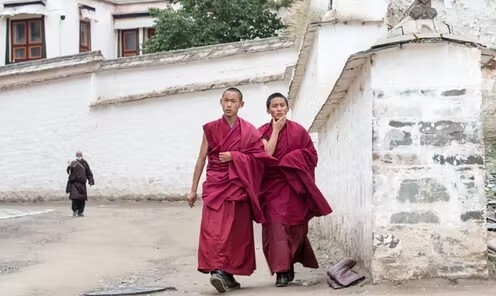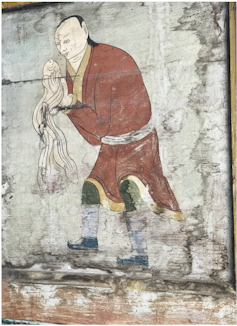Celibacy: its surprising evolutionary advantages – new research
![]()
![]()
![]()
![]()
![]()
![]()
![]()
![]()
![]()
![]()
![]()
![]()
![]()
![]()
![]()
![]()
![]()
![]()
![]()
![]()
Celibacy: its surprising evolutionary advantages – new research

Nature wants us to reproduce, so how come celibacy evolved? Carsten ten Brink/Flickr, CC BY-NC-ND
Why would someone join an institution that removed the option of family life and required them to be celibate? Reproduction, after all, is at the very heart of the evolution that shaped us. Yet many religious institutions around the world require exactly this. The practice has led anthropologists to wonder how celibacy could have evolved in the first place.
Some have suggested that practices that are costly to individuals, such as never having children, can still emerge when people blindly conform to norms that benefit a group – since cooperation is another cornerstone of human evolution. Others have argued that people ultimately create religious (or other) institutions because it serves their own selfish or family interest, and reject those who do not get involved.
Now our new study, published in Royal Society Proceedings B and conducted in Western China, tackles this fundamental question by studying lifelong religious celibacy in Tibetan Buddhist monasteries.
Until recently, it was common for some Tibetan families to send one of their young sons to the local monastery to become a lifelong, celibate monk. Historically, up to one in seven boys became monks. Families typically cited religious motives for having a monk in the family. But were economic and reproductive considerations also involved?
With our collaborators from Lanzhou University in China, we interviewed 530 households in 21 villages in the eastern part of the Tibetan plateau, in Gansu province. We reconstructed family genealogies, gathering information about each person’s family history and whether any of their family members were monks.

Painting of a monk in a Buddhist monastery. Author provided
These villages are inhabited by patriarchal Amdo Tibetans who raise herds of yaks and goats, and farm small plots of land. Wealth is generally passed down the male line in these communities.
We found that men with a brother who was a monk were wealthier, owning more yaks. But there was little or no benefit for sisters of monks. That’s likely because brothers are in competition over parental resources, land and livestock. As monks cannot own property, by sending one of their sons to the monastery, parents put an end to this fraternal conflict. Firstborn sons generally inherit the parental household, whereas monks are usually second or later born sons.
Surprisingly, we also found that men with a monk brother had more children than men with non-celibate brothers; and their wives tended to have children at an earlier age. Grandparents with a monk son also had more grandchildren, as their non-celibate sons faced less or no competition with their brothers. The practice of sending a son to the monastery, far from being costly to a parent, is therefore in line with a parent’s reproductive interests.
A mathematical model of celibacy
This hints that celibacy can evolve by natural selection. To find out more about the details of how this happens, we built a mathematical model of the evolution of celibacy, where we studied the consequences of becoming a monk on a man’s evolutionary fitness, that of his brothers and of other members of the village. We modelled both the case where the decision to send a boy to a monastery is made by parents, as seems to be the case in our field study, and where a boy makes his own decision.
Monks remaining single means there are fewer men competing for marriage to women in the village. But while all the men in the village might benefit if one of them becomes a monk, the monk’s decision does not further his own genetic fitness. Therefore, celibacy shouldn’t evolve.
That situation changes, however, if having a brother who is a monk makes men wealthier and therefore more competitive on the marriage market. Religious celibacy can now evolve by natural selection because, while the monk is not having any children, he is helping his brothers to have more. But importantly, if the choice to become a monk is down to the boy himself, it is likely to remain rare – from an individual’s perspective, it isn’t very advantageous.
In the model, we show that celibacy becomes much more common only if it is the parents who decide it should happen. Parents gain fitness from all their children, so they will send one to the monastery as long as there is a benefit for the others. The fact that boys were sent to the monastery at a young age, with much celebration, and faced dishonour if they later abandoned their role, suggests a cultural practice shaped by parental interests.
This model could potentially also clarify the evolution of other kinds of parental favouritism in other cultural contexts – even infanticide. And a similar framework might explain why female celibates (nuns) are rare in patriarchal societies such as Tibet, but might be more common in societies where women are in greater competition with each other – for example, where they have more inheritance rights (such as in parts of Europe).
We are currently developing new research to understand why the frequency of monks and nuns varies in different religions and parts of the world.
It is often suggested that the spread of new ideas – even irrational ones – can result in the creation of new institutions as people conform to a new standard. But it may be that institutions can also be shaped by people’s reproductive and economic decisions.
Reference: By Ruth Mace, Alberto Micheletti
Articles - Latest
- Earthquakes can trigger quartz into forming giant gold nuggets, study finds
- Linda Nolan, singer and television personality, dies aged 65
- Sly Stone, pioneering funk and soul musician, dies aged 82
- Dangers of an overloaded car include:
- Natural Disaster today
- Japan earthquake: Kushiro shakes for 'too long' as 6.1 mag tremor hits
- 'Cult' members jailed over coroner kidnap plot
- Flood risk threatens Swiss valley after glacier destroys village
- Thailand Grapples with Floods and Economic Shifts: Government Response, Community Resilience, and Market Predictions
- Powerful hailstorm floods buildings and streets in Gniezno
- The Significance of the 49-Day Journey After Death
- Killing prisoners for transplants: Forced organ harvesting in China
- Southern Japan hit by 6.6-magnitude quake near Nankai Trough, tsunami warnings lifted
- Peru’s coastline battered by tsunami-like waves one day after country declares environmental emergency
- California fires live updates: ‘Dangerous’ winds return as residents are warned over threat of new wildfires
- Osibisa founding member and singer Teddy Osei dead at 88
- Oliviero Toscani, photographer behind shock Benetton ads, dead at 82
- California LA Mayor Karen Bass awkwardly ignores questions from reporter about California fires
- UK set for more freezing weather as homes and businesses deal with flooding
- Jean-Marie Le Pen dead at 96: His political career through the years
- Jimmy Carter, former US president, dies aged 100
- ‘Jazz’s most significant composer’ Benny Golson dies at 95
- Billionaire founder of fashion chain Mango dies in accident
Articles - Most Read
- Main
- Contact Us
- The science behind Ouija boards
- Cosmic Consciousness - What is Cosmic Consciousness-2
- Cosmic Consciousness - Introduction-2
- Cosmic Consciousness-Introduction
- MASSIVE 6.1 MAGNITUDE EARTHQUAKE HITS NEW ZEALAND AS NATION STILL REELING FROM CYCLONE
- ARCHAEOLOGISTS UNRAVEL THE TRUTH OF APHRODITE, GODDESS OF LOVE, ON VALENTINE'S DAY
- Cosmic Consciousness First Words - 1V - 2
- The Human Condition-Thomas Keating
- Cosmic Consciousness First Words - V -
- Cosmic Consciousness V - 2
- Shakyamuni Buddha or India the 1st “Black Revolutionary Hero.”
- Cosmic consciousness - First Words - IV
- Cosmic Consciousness - What is Cosmic Consciousness?
- The Human Condition-2-Thomas Keating
- Evolution and Devolution-Chapter 2
- The Human Condition - Thomas keating-3
- Drinking From The Mountain Stream - Milarepa
- Cosmic Consciousness-On the Plane of Self Consciousness
- The Human Condition - 4
- Cosmic Consciousness - 3 - On the Plane of Self Consciousness
- The Human Condition - 6
- Evolution and Devolution-Chapter 1
- The Buddhist System of Liberation - 2
- Contemplation and the Divine Therapy - 2
- On the Plane of Self Consciousness - 2
- Milarepa's World-2
- The Human Condition - 5
- On the Plane of Self Consciousness IV
- Milarepa's World
- The Buddhist System of Liberation
- On the Plane of Self Consciousness IV - 2
- JERRY RAWLINGS, GHANAIAN STRONG MAN WHO CAME TO POWER IN A COUP BUT INTRODUCED DEMOCRACY – OBITUARY


